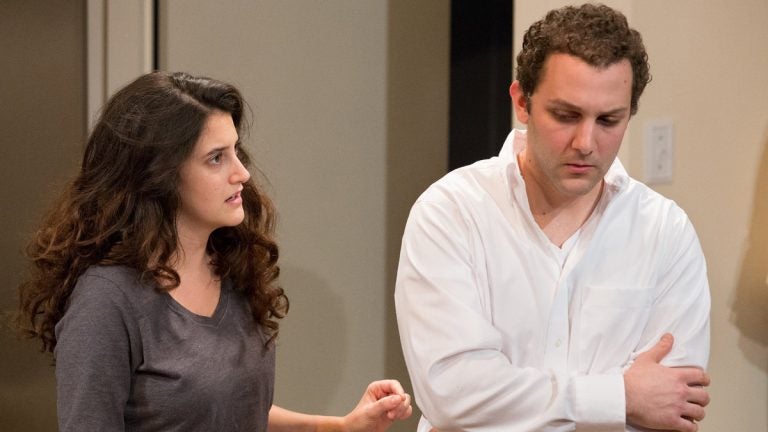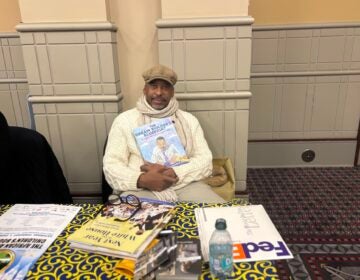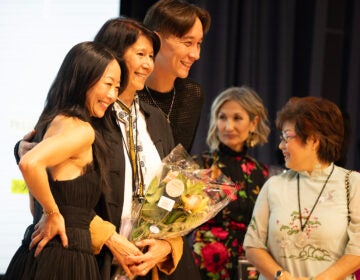Review: Not just ‘Bad Jews,’ but shrill, too

Sofie Yavorsky and Greg Fallick in 'Bad Jews' at Walnut Street Theatre’s Independence Studio on 3. (Photo courtesy of Mark Garvin)
At sundown Thursday, a Jewish holy day, I went to see the opening of a play called “Bad Jews,” and I would’ve been way better off at the synagogue. Despite its provocative title, Joshua Harmon’s play is not ethnically offensive, so I doubt you’ll find Jewish pickets marching outside the Walnut Street Theatre unless they’re part of a larger protest against stunningly irritating playwriting.
Joshua Harmon’s play about cousins who fight for ownership of their just-deceased grandfather’s necklace – it has a chai pendant, the two-letter Hebrew word for life – doesn’t feature a single character you’d be interested in spending time with: Not the super-Jewish, venomous, attack-dog of a Vassar student named Daphna (Sophie Yavorsky), so rude and exploitive and constant that she’s written more as a mouth than a complete human; and not her opposite self, a good-for-nothing, spineless cousin named Jonah (Greg Fallick), or his brother Liam (Davy Raphaely), a proudly assimilated Jew in post-graduate studies of Japanese culture. Not even Liam’s blonde, blue-eyed, good-hearted yet vapid girlfriend Melody (Laura Giknis), the non-Jewish squeeze he’s been skiing with in Aspen while his grandfather lays dying. Liam, who has missed grandpa’s funeral, has brought Melody home to the Upper West Side for the shiva.
Harmon is a hot item – he’s under commission at Lincoln Center Theatre and Roundabout Theatre Company, even as he toils in Juilliard’s playwriting program. Indeed, “Bad Jews” opened Off-Broadway last year at the Roundabout and was a house-filling success. The Walnut is producing it as part of the series in its intimate third-floor playing space, decked out by set designer Glen Sears as a handsome studio apartment given to Joshua and Liam by their parents, who live in the same building.
The cast, under David Stradley’s direction, manages to breathe life into this collection of cardboard – and to Stradley’s credit, he takes the already overheated script on a full-tilt ride, probably the only sensible way to approach it. The character Daphna is a non-stop bag of venom, and Yavorsky has the acting goods to give her what the playwright intends, which for me is tantamount to audience abuse.
In one particularly exploitive scene, she gets information from Liam’s girlfriend that she can use against him for later mockery. She also tells the girlfriend that Liam’s ceremonial Hebrew name is Shlomo, just so she can make fun of the name’s sound, and of him. But that’s an example of the play’s shallowness – I know of no so-called super-Jew who could resist explaining that the name is honorable because it’s a derivative of shalom, the Hebrew word for peace. Except for this play’s Daphna. (Whose given name, we are told, is Diane.)
“Bad Jews” has its moments – some are laugh-out-loud funny and one involves Giknis’ out-of-kilter rendition of the song “Summertime” from “Porgy and Bess,” destined to draw nightly applause. And although the fight over the “chai” necklace could be a real one for some family somewhere, here it’s nastily loaded trash-talk about who’s more Jewish than whom, and therefore more deserving. (If you wanted to look at “Bad Jews” as a metaphor, probably a questionable exercise, you could argue cantankerously that Daphna’s really not a character at all: She’s a concept — the way ultra-Orthodox Jews perceive everyone else who practices or identifies with the faith.)
There are heart-strings attached to all this. The “chai” necklace had been given to grandpop by his father, and grandpop kept it with him in Europe through the Holocaust by hiding it under his tongue. And there’s one other tug at emotions I will not detail, except to say this: The playwright gets a character to do something so unlikely, given the persona created for him, that it’s a cheap theatrical trick. Alas, for many people it probably works – the opening-night audience seemed to buy into it as if it were a hot stock on Wall Street. I felt wholly exploited by it but then, it seemed to meld with my experience in general.
“Bad Jews” has been extended through Dec. 28 at the Independence Studio on the third floor of the Walnut Street Theatre, on Walnut between Eighth and Ninth Streets. 215-574-3550 or www.walnutstreettheatre.org.
WHYY is your source for fact-based, in-depth journalism and information. As a nonprofit organization, we rely on financial support from readers like you. Please give today.




